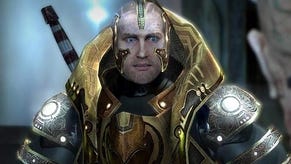GC: Silicon Knights' Denis Dyack
On a unified gaming format and why it will happen.
Yep - that's one of the broadly misunderstood concepts of commoditisation. Monopolistic markets stifle innovation. In a commoditised market, innovation and competition is much more rapid, so the amount of money of people competing in an open marketplace is much higher. Have you ever heard people complain about the cost of a hard drive for this particular console and why it's so expensive compared to a PC? That's because it's a non-competitive market. Every first party's guilty of this. That's why it's a closed system.
The big difference is people think that this current marketplace is more competitive - that Sony is competing against Microsoft is competing against Nintendo, and Nintendo's come right forward and said, overtly, 'we're not competing', because it's a non-competitive model, and they can work within this model. If we're in the open marketplace I'm talking about, competition would be much more fierce, consoles would be much lower in price, games would be lower, and when you bought a game, you would know it would work on your system. You wouldn't have to buy a Nintendo to play Miyamoto-san's games, you wouldn't have to buy a Sony to play a Ratchet & Clank game, and I think that's better for everyone.
The one thing would I say to everyone is that with commoditisation, the consumer almost always wins. It's cheaper games, cheaper hardware, and more availability and standardisation for everyone. You look at some titles like first-person shooters - Resistance: Fall of Man came out the same time as Gears of War...

They weren't competing at all, and shouldn't they have been? There you have a non-competitive marketplace, and you have to really ask yourself 'is that good for the market?' Why shouldn't they be able to play both and compare on one system?
When technologies like the sewing machine are introduced, they're personified as these freeing, liberating, just awe-inspiring things that are going to change our lives for the better. That's how consoles are always introduced. The sewing machine was introduced to free up women's time, but what happened when it was mass-produced is sweatshops were created, and it had the exact opposite effect.
Technology really needs to be understood from that level, and I don't really want to talk too much about Too Human, but that's a lot of the things we're talking about with technology in Too Human - is really understanding the effects of technology on society.
Absolutely. Which is the same as when you think about buying a DVD player, or the same as buying an automobile, quite frankly. There's Porsches, and there's Minis, or whatever. There's different types of cars, but they're all cars, they all push on the pedal for gas and you turn the wheel to drive it, and that's it.
I actually think that Microsoft has been the most proactive in the Internet space.

I actually think that's their real console.
Take technology from an infinite standpoint of imagining memory where there's no limits, and the computing is so fast you never have to wait for anything, and the graphics display, whether it's your retina or whatever, you can do as many colours as you want and there's nothing limited. Internet bandwidth is absolutely limitless - it's just as fast as your GPUs or your CPU. What happens is there's no hardware. Imagine it being so small you can't even see it any more, and all you really have then is your Internet piped to your service provider and that's Microsoft Live.
I think Microsoft has been really forward-thinking in that way, and I actually think it could be their future console in the end, because if you talk about what I'm saying to the extreme, the hardware gets commoditised to such an extent that there absolutely is no value, whereas the value is all in software. Live is software, and that's what Microsoft is known for - software - and certainly they're very, very smart people. And I think from that perspective it's something that nobody else can do.
Also very, very smart people, and where they're going they're certainly being very experimental with Home, and stuff, and I'm really interested to see where that goes. I think that's got potential.
And Nintendo, who's been traditionally wary of online is now stepping into the fray as well. I don't think anyone can ignore that space. I think whether you're playing a multiplayer game or a single-player game that's going to be the future mode of delivery, because of piracy issues and all kinds of other things. In the issue of piracy, a movie's linear, you can record that and get the same experience once you record it. If you play a videogame, you can record yourself having that interaction, but it's not the same as you actually having that interaction, so the problem with piracy is people take something, make a copy, and then duplicate it and pass around - you cannot make a copy of you interacting, so with an online delivery standpoint, imagine things are so fast that you don't even get the software any more - you just hook into a central server and you can play.








